外研版七年级上Module 9 People and places Language points(共13张PPT)
文档属性
| 名称 | 外研版七年级上Module 9 People and places Language points(共13张PPT) | 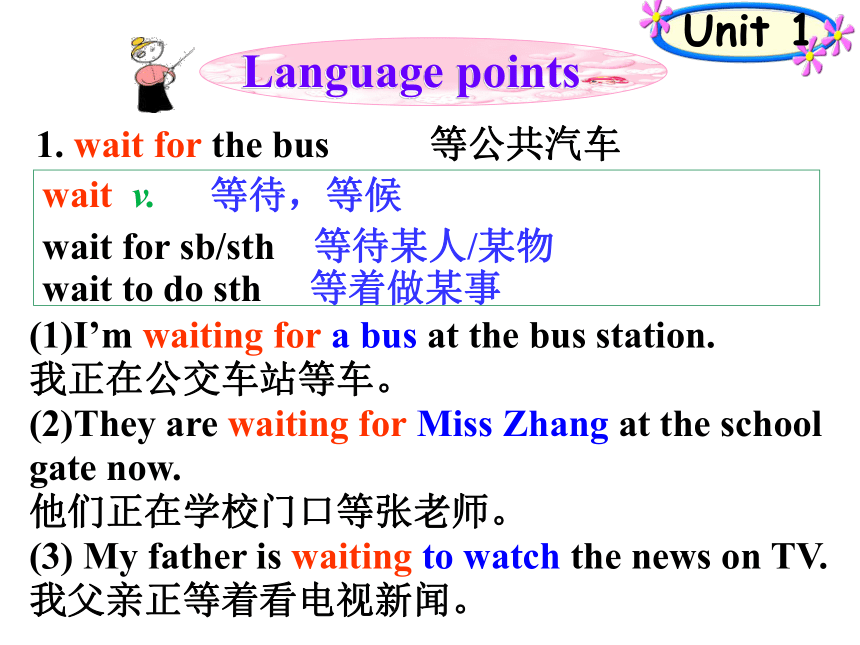 | |
| 格式 | zip | ||
| 文件大小 | 243.3KB | ||
| 资源类型 | 教案 | ||
| 版本资源 | 外研版 | ||
| 科目 | 英语 | ||
| 更新时间 | 2022-10-12 16:58:28 | ||
图片预览

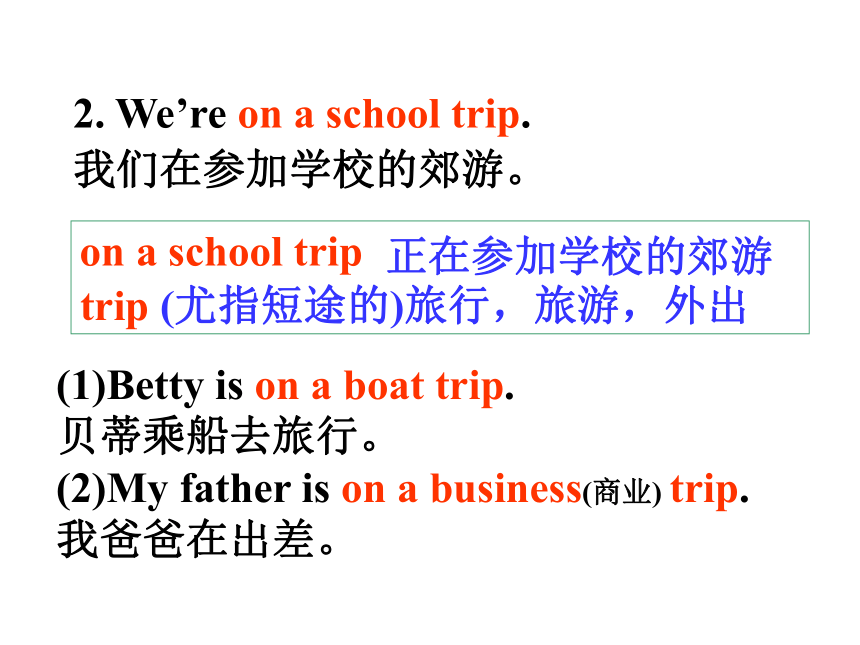
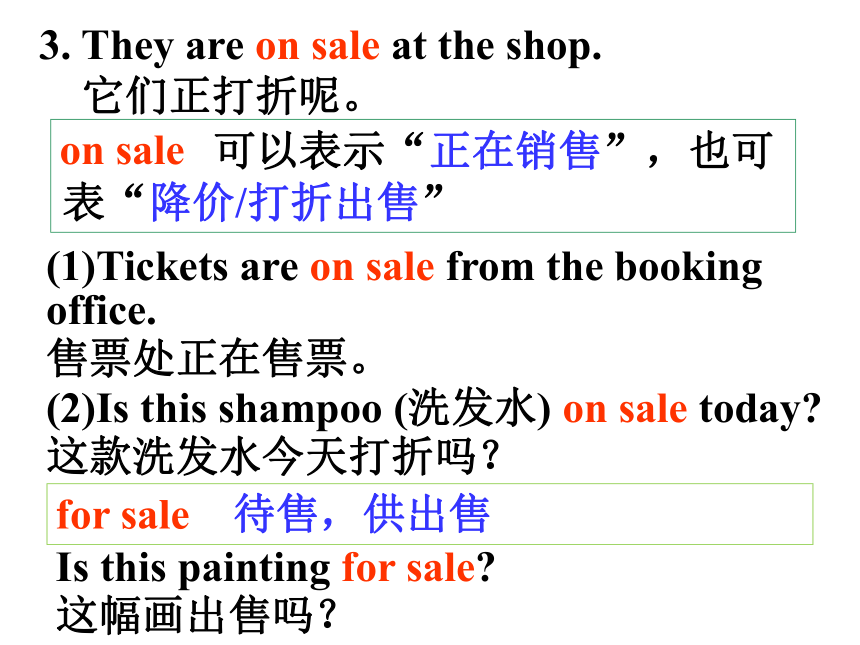
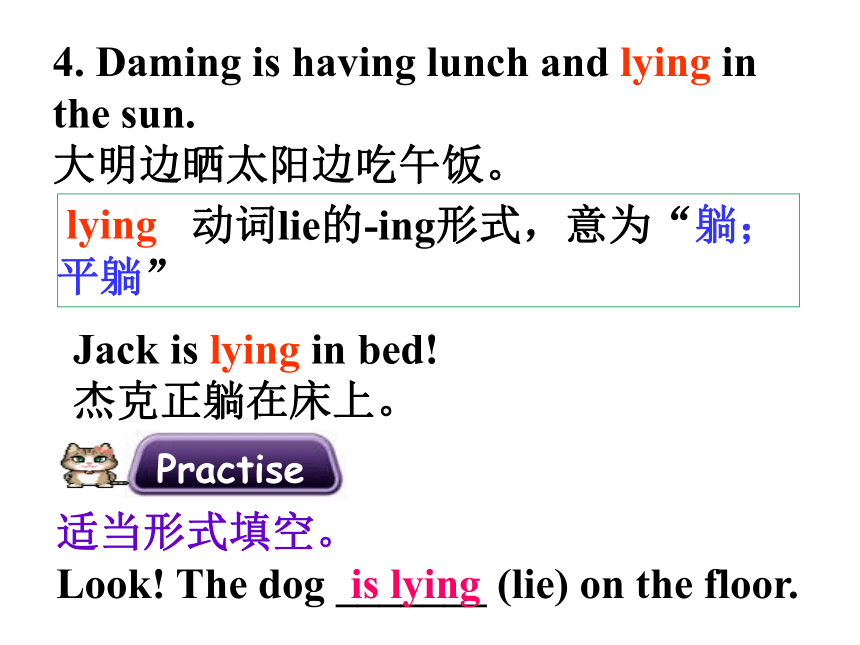

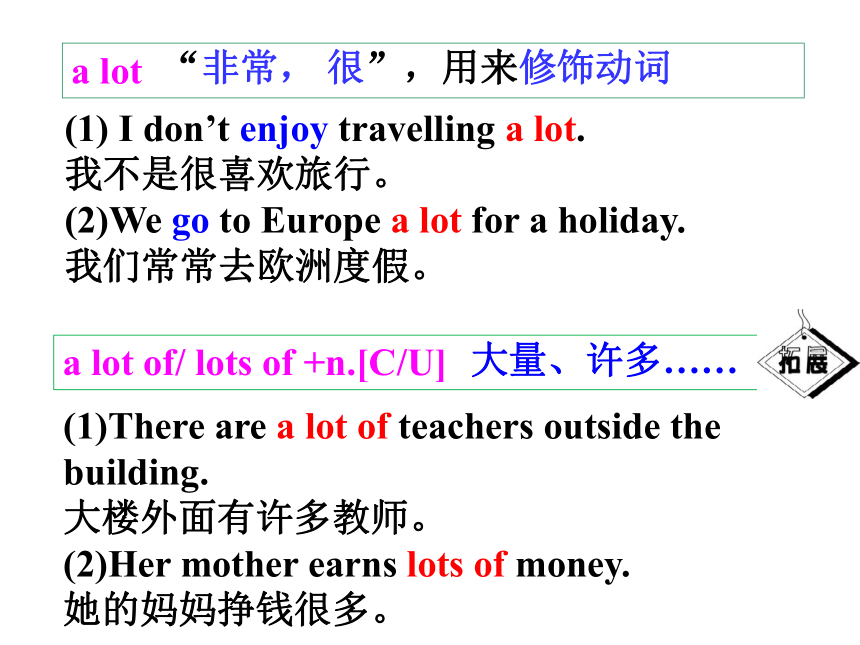
文档简介
(共13张PPT)
1. wait for the bus
wait v.
(1)I’m waiting for a bus at the bus station.
我正在公交车站等车。
(2)They are waiting for Miss Zhang at the school gate now.
他们正在学校门口等张老师。
(3) My father is waiting to watch the news on TV.
我父亲正等着看电视新闻。
Language points
Unit 1
等公共汽车
等待,等候
wait for sb/sth 等待某人/某物
wait to do sth 等着做某事
2. We’re on a school trip.
我们在参加学校的郊游。
on a school trip
(1)Betty is on a boat trip.
贝蒂乘船去旅行。
(2)My father is on a business(商业) trip.
我爸爸在出差。
trip (尤指短途的)旅行,旅游,外出
正在参加学校的郊游
3. They are on sale at the shop.
它们正打折呢。
on sale
(1)Tickets are on sale from the booking office.
售票处正在售票。
(2)Is this shampoo (洗发水) on sale today
这款洗发水今天打折吗?
可以表示“正在销售”,也可表“降价/打折出售”
for sale 待售,供出售
Is this painting for sale
这幅画出售吗?
4. Daming is having lunch and lying in the sun.
大明边晒太阳边吃午饭。
lying
Jack is lying in bed!
杰克正躺在床上。
适当形式填空。
Look! The dog _______ (lie) on the floor.
Practise
is lying
动词lie的-ing形式,意为“躺;平躺”
5. We’re enjoying the school trip a lot.
我们玩得真高兴。
enjoy v.
(1) He enjoys swimming.
他喜爱游泳。
(2) Thanks for a great evening. I really enjoyed it.
感谢你这美好的晚会。我真的玩得很开心。
enjoy oneself =have a good time
玩得开心,过得愉快
“喜爱,享受……的乐趣”,后常接名词、代词或V-ing作宾语。
I am really enjoying myself at the moment.
我此刻很是自得其乐。
(1) I don’t enjoy travelling a lot.
我不是很喜欢旅行。
(2)We go to Europe a lot for a holiday.
我们常常去欧洲度假。
(1)There are a lot of teachers outside the building.
大楼外面有许多教师。
(2)Her mother earns lots of money.
她的妈妈挣钱很多。
a lot of/ lots of +n.[C/U]
a lot
“非常, 很”,用来修饰动词
大量、许多……
5. I’m calling my mother.
我正给我妈妈打电话。
call v.
(1)Nancy calls her mother every Saturday afternoon.
南茜每周六下午都要给她母亲打电话。
(2)You can call Mr Zhao at 753 264.
你可以拨打753264找赵先生。
(给……)打电话,其后可直接跟打电话的对象,即 call sb.
call sb. at+电话号码 “拨打电话号码……找某人
1. At this moment, in different places of the world, people are doing different things.
at the/this moment
Language points
Unit 2
(1) She is sleeping at the moment.
现在她正在睡觉。
(2) We’re really busy at the moment.
目前我们很忙。
常见短语:for a moment 一会儿
wait a moment 稍等
此刻,现在,目前,常用在现在进行时态中。
此时此刻,世界上不同地方的人们正做着不同的事情。
2. … and people are leaving work and are going home.
人们正下班往家赶。
leave v.
(1) My baby gets upset(沮丧的) when I leave the room.
当我离开房间时,我的宝宝变得很沮丧。
(2) You can leave work early to go home.
你可以提前下班回家。
leave work 下班
离开
leave+地方 离开某地
(1) Tom wants to leave home.
汤姆想离开家。
(2) Next Friday, Alice is leaving for London.
下周五,爱丽丝要去伦敦了。
(3) Leave a message on my voicemail.
给我的语音信箱留言。
leave for+地点名词 动身去某地
leave a message 留言
3. Some are getting off buses or trains.
有些人正从公交车或火车上下来。
get off
(1) Ecxcuse me, I have to get off at the next stop.
劳驾,我必须在下一站下车。
(2) You can’t get off the bus until it stops.
公共汽车停了你才能下车。
下(飞机,火车,公共汽车等)
反义:get on 上(飞机、火车、公共汽车等)
4. Some people are driving home.
一些人正开车回家。
drive v.
(1) They’ll drive to New York next Tuesday.
下周二他们将开车去纽约。
(2) Tom and Judy are driving home after having dinner at a restaurant.
汤姆和朱迪在餐厅吃完晚饭后开车回家。
驾驶,驾车
drive home “开车回家”,因home为地点副词,故drive和home之间不用介词to。
5. In Moscow, it’s eight o’clock in the evening, so people aren’t having afternoon tea.
莫斯科现在正是晚上8点,所以没人喝下午茶。
so conj.
(1) I am hungry so I buy a hamburger.
我饿了所以我买了一个汉堡包吃。
(2) She didn’t come, so I went there alone.
她没有来,所以我只好自己去。
因此,所以
在此类结构中,so 之前可以用逗号,也可以不用。
1. wait for the bus
wait v.
(1)I’m waiting for a bus at the bus station.
我正在公交车站等车。
(2)They are waiting for Miss Zhang at the school gate now.
他们正在学校门口等张老师。
(3) My father is waiting to watch the news on TV.
我父亲正等着看电视新闻。
Language points
Unit 1
等公共汽车
等待,等候
wait for sb/sth 等待某人/某物
wait to do sth 等着做某事
2. We’re on a school trip.
我们在参加学校的郊游。
on a school trip
(1)Betty is on a boat trip.
贝蒂乘船去旅行。
(2)My father is on a business(商业) trip.
我爸爸在出差。
trip (尤指短途的)旅行,旅游,外出
正在参加学校的郊游
3. They are on sale at the shop.
它们正打折呢。
on sale
(1)Tickets are on sale from the booking office.
售票处正在售票。
(2)Is this shampoo (洗发水) on sale today
这款洗发水今天打折吗?
可以表示“正在销售”,也可表“降价/打折出售”
for sale 待售,供出售
Is this painting for sale
这幅画出售吗?
4. Daming is having lunch and lying in the sun.
大明边晒太阳边吃午饭。
lying
Jack is lying in bed!
杰克正躺在床上。
适当形式填空。
Look! The dog _______ (lie) on the floor.
Practise
is lying
动词lie的-ing形式,意为“躺;平躺”
5. We’re enjoying the school trip a lot.
我们玩得真高兴。
enjoy v.
(1) He enjoys swimming.
他喜爱游泳。
(2) Thanks for a great evening. I really enjoyed it.
感谢你这美好的晚会。我真的玩得很开心。
enjoy oneself =have a good time
玩得开心,过得愉快
“喜爱,享受……的乐趣”,后常接名词、代词或V-ing作宾语。
I am really enjoying myself at the moment.
我此刻很是自得其乐。
(1) I don’t enjoy travelling a lot.
我不是很喜欢旅行。
(2)We go to Europe a lot for a holiday.
我们常常去欧洲度假。
(1)There are a lot of teachers outside the building.
大楼外面有许多教师。
(2)Her mother earns lots of money.
她的妈妈挣钱很多。
a lot of/ lots of +n.[C/U]
a lot
“非常, 很”,用来修饰动词
大量、许多……
5. I’m calling my mother.
我正给我妈妈打电话。
call v.
(1)Nancy calls her mother every Saturday afternoon.
南茜每周六下午都要给她母亲打电话。
(2)You can call Mr Zhao at 753 264.
你可以拨打753264找赵先生。
(给……)打电话,其后可直接跟打电话的对象,即 call sb.
call sb. at+电话号码 “拨打电话号码……找某人
1. At this moment, in different places of the world, people are doing different things.
at the/this moment
Language points
Unit 2
(1) She is sleeping at the moment.
现在她正在睡觉。
(2) We’re really busy at the moment.
目前我们很忙。
常见短语:for a moment 一会儿
wait a moment 稍等
此刻,现在,目前,常用在现在进行时态中。
此时此刻,世界上不同地方的人们正做着不同的事情。
2. … and people are leaving work and are going home.
人们正下班往家赶。
leave v.
(1) My baby gets upset(沮丧的) when I leave the room.
当我离开房间时,我的宝宝变得很沮丧。
(2) You can leave work early to go home.
你可以提前下班回家。
leave work 下班
离开
leave+地方 离开某地
(1) Tom wants to leave home.
汤姆想离开家。
(2) Next Friday, Alice is leaving for London.
下周五,爱丽丝要去伦敦了。
(3) Leave a message on my voicemail.
给我的语音信箱留言。
leave for+地点名词 动身去某地
leave a message 留言
3. Some are getting off buses or trains.
有些人正从公交车或火车上下来。
get off
(1) Ecxcuse me, I have to get off at the next stop.
劳驾,我必须在下一站下车。
(2) You can’t get off the bus until it stops.
公共汽车停了你才能下车。
下(飞机,火车,公共汽车等)
反义:get on 上(飞机、火车、公共汽车等)
4. Some people are driving home.
一些人正开车回家。
drive v.
(1) They’ll drive to New York next Tuesday.
下周二他们将开车去纽约。
(2) Tom and Judy are driving home after having dinner at a restaurant.
汤姆和朱迪在餐厅吃完晚饭后开车回家。
驾驶,驾车
drive home “开车回家”,因home为地点副词,故drive和home之间不用介词to。
5. In Moscow, it’s eight o’clock in the evening, so people aren’t having afternoon tea.
莫斯科现在正是晚上8点,所以没人喝下午茶。
so conj.
(1) I am hungry so I buy a hamburger.
我饿了所以我买了一个汉堡包吃。
(2) She didn’t come, so I went there alone.
她没有来,所以我只好自己去。
因此,所以
在此类结构中,so 之前可以用逗号,也可以不用。
同课章节目录
- Starte
- Module 1 My teacher and my friends
- Module 2 My English lesson
- Module 3 My English book
- Module 4 My everyday life
- Module 1 My classmates
- Unit 1 Nice to meet you.
- Unit 2 I'm Wang Lingling and I'm thirteen years ol
- Unit 3 Language in use.
- Module 2 My family
- Unit 1 Is this your mum?
- Unit 2 These are my parents.
- Unit 3 Language in use.
- Module 3 My school
- Unit 1 There are thirty students in my class.
- Unit 2 The library is on the left of the playgroun
- Unit 3 Language in use.
- Module 4 Healthy food
- Unit 1 We've got lots of apples.
- Unit 2 Is your food and drink healthy?
- Unit 3 Language in use.
- Module 5 My school day
- Unit 1 I love history.
- Unit 2 We start work at nine o'clock.
- Unit 3 Language in use.
- Revision module A
- Module 6 A trip to the zoo
- Unit 1 Does it eat meat?
- Unit 2 The tiger lives in Asia.
- Unit 3 Language in use.
- Module 7 Computers
- Unit 1 How do I write my homework on the computer?
- Unit 2 When do you use a computer?
- Unit 3 Language in use.
- Module 8 Choosing presents
- Unit 1 I always like birthday parties.
- Unit 2 She often goes to concerts.
- Unit 3 Language in use.
- Module 9 People and places
- Unit 1 We're enjoying the school trip a lot.
- Unit 2 They're waiting for buses or trains.
- Unit 3 Language in use.
- Module 10 Spring Festival
- Unit 1 Are you getting ready for Spring Festival?
- Unit 2 My mother's cleaning our houses and sweepin
- Unit 3 Language in use.
- Revision module B
